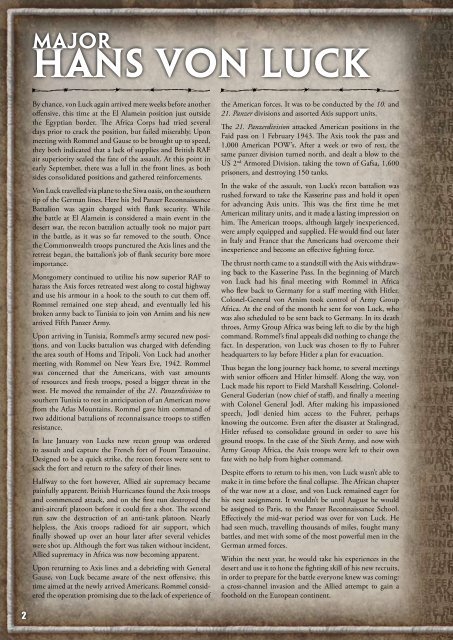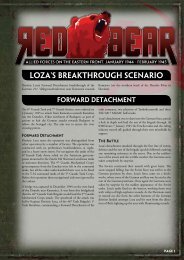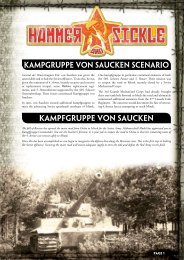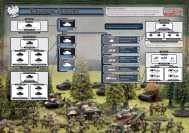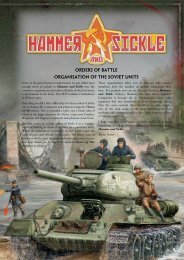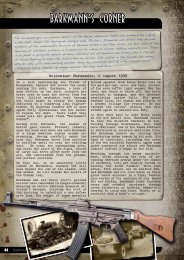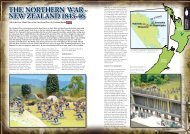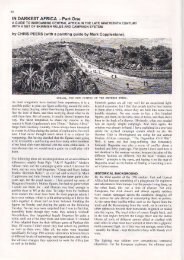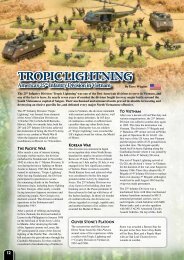Major Hans von Luck - Flames of War
Major Hans von Luck - Flames of War
Major Hans von Luck - Flames of War
Create successful ePaper yourself
Turn your PDF publications into a flip-book with our unique Google optimized e-Paper software.
<strong>Major</strong><br />
<strong>Hans</strong> <strong>von</strong> <strong>Luck</strong><br />
By chance, <strong>von</strong> <strong>Luck</strong> again arrived mere weeks before another<br />
<strong>of</strong>fensive, this time at the El Alamein position just outside<br />
the Egyptian border. The Africa Corps had tried several<br />
days prior to crack the position, but failed miserably. Upon<br />
meeting with Rommel and Gause to be brought up to speed,<br />
they both indicated that a lack <strong>of</strong> supplies and British RAF<br />
air superiority sealed the fate <strong>of</strong> the assault. At this point in<br />
early September, there was a lull in the front lines, as both<br />
sides consolidated positions and gathered reinforcements.<br />
Von <strong>Luck</strong> travelled via plane to the Siwa oasis, on the southern<br />
tip <strong>of</strong> the German lines. Here his 3rd Panzer Reconnaissance<br />
Battalion was again charged with flank security. While<br />
the battle at El Alamein is considered a main event in the<br />
desert war, the recon battalion actually took no major part<br />
in the battle, as it was so far removed to the south. Once<br />
the Commonwealth troops punctured the Axis lines and the<br />
retreat began, the battalion’s job <strong>of</strong> flank security bore more<br />
importance.<br />
Montgomery continued to utilize his now superior RAF to<br />
harass the Axis forces retreated west along to costal highway<br />
and use his armour in a hook to the south to cut them <strong>of</strong>f.<br />
Rommel remained one step ahead, and eventually led his<br />
broken army back to Tunisia to join <strong>von</strong> Arnim and his new<br />
arrived Fifth Panzer Army.<br />
Upon arriving in Tunisia, Rommel’s army secured new positions,<br />
and <strong>von</strong> <strong>Luck</strong>s battalion was charged with defending<br />
the area south <strong>of</strong> Homs and Tripoli. Von <strong>Luck</strong> had another<br />
meeting with Rommel on New Years Eve, 1942. Rommel<br />
was concerned that the Americans, with vast amounts<br />
<strong>of</strong> resources and fresh troops, posed a bigger threat in the<br />
west. He moved the remainder <strong>of</strong> the 21. Panzerdivision to<br />
southern Tunisia to rest in anticipation <strong>of</strong> an American move<br />
from the Atlas Mountains. Rommel gave him command <strong>of</strong><br />
two additional battalions <strong>of</strong> reconnaissance troops to stiffen<br />
resistance.<br />
In late January <strong>von</strong> <strong>Luck</strong>s new recon group was ordered<br />
to assault and capture the French fort <strong>of</strong> Foum Tataouine.<br />
Designed to be a quick strike, the recon forces were sent to<br />
sack the fort and return to the safety <strong>of</strong> their lines.<br />
Halfway to the fort however, Allied air supremacy became<br />
painfully apparent. British Hurricanes found the Axis troops<br />
and commenced attack, and on the first run destroyed the<br />
anti-aircraft platoon before it could fire a shot. The second<br />
run saw the destruction <strong>of</strong> an anti-tank platoon. Nearly<br />
helpless, the Axis troops radioed for air support, which<br />
finally showed up over an hour later after several vehicles<br />
were shot up. Although the fort was taken without incident,<br />
Allied supremacy in Africa was now becoming apparent.<br />
Upon returning to Axis lines and a debriefing with General<br />
Gause, <strong>von</strong> <strong>Luck</strong> became aware <strong>of</strong> the next <strong>of</strong>fensive, this<br />
time aimed at the newly arrived Americans. Rommel considered<br />
the operation promising due to the lack <strong>of</strong> experience <strong>of</strong><br />
the American forces. It was to be conducted by the 10. and<br />
21. Panzer divisions and assorted Axis support units.<br />
The 21. Panzerdivision attacked American positions in the<br />
Faid pass on 1 February 1943. The Axis took the pass and<br />
1,000 American POW’s. After a week or two <strong>of</strong> rest, the<br />
same panzer division turned north, and dealt a blow to the<br />
US 2 nd Armored Division, taking the town <strong>of</strong> Gafsa, 1,600<br />
prisoners, and destroying 150 tanks.<br />
In the wake <strong>of</strong> the assault, <strong>von</strong> <strong>Luck</strong>’s recon battalion was<br />
rushed forward to take the Kasserine pass and hold it open<br />
for advancing Axis units. This was the first time he met<br />
American military units, and it made a lasting impression on<br />
him. The American troops, although largely inexperienced,<br />
were amply equipped and supplied. He would find out later<br />
in Italy and France that the Americans had overcome their<br />
inexperience and become an effective fighting force.<br />
The thrust north came to a standstill with the Axis withdrawing<br />
back to the Kasserine Pass. In the beginning <strong>of</strong> March<br />
<strong>von</strong> <strong>Luck</strong> had his final meeting with Rommel in Africa<br />
who flew back to Germany for a staff meeting with Hitler.<br />
Colonel-General <strong>von</strong> Arnim took control <strong>of</strong> Army Group<br />
Africa. At the end <strong>of</strong> the month he sent for <strong>von</strong> <strong>Luck</strong>, who<br />
was also scheduled to be sent back to Germany. In its death<br />
throes, Army Group Africa was being left to die by the high<br />
command. Rommel’s final appeals did nothing to change the<br />
fact. In desperation, <strong>von</strong> <strong>Luck</strong> was chosen to fly to Fuhrer<br />
headquarters to lay before Hitler a plan for evacuation.<br />
Thus began the long journey back home, to several meetings<br />
with senior <strong>of</strong>ficers and Hitler himself. Along the way, <strong>von</strong><br />
<strong>Luck</strong> made his report to Field Marshall Kesselring, Colonel-<br />
General Guderian (now chief <strong>of</strong> staff), and finally a meeting<br />
with Colonel General Jodl. After making his impassioned<br />
speech, Jodl denied him access to the Fuhrer, perhaps<br />
knowing the outcome. Even after the disaster at Stalingrad,<br />
Hitler refused to consolidate ground in order to save his<br />
ground troops. In the case <strong>of</strong> the Sixth Army, and now with<br />
Army Group Africa, the Axis troops were left to their own<br />
fate with no help from higher command.<br />
Despite efforts to return to his men, <strong>von</strong> <strong>Luck</strong> wasn’t able to<br />
make it in time before the final collapse. The African chapter<br />
<strong>of</strong> the war now at a close, and <strong>von</strong> <strong>Luck</strong> remained eager for<br />
his next assignment. It wouldn’t be until August he would<br />
be assigned to Paris, to the Panzer Reconnaissance School.<br />
Effectively the mid-war period was over for <strong>von</strong> <strong>Luck</strong>. He<br />
had seen much, travelling thousands <strong>of</strong> miles, fought many<br />
battles, and met with some <strong>of</strong> the most powerful men in the<br />
German armed forces.<br />
Within the next year, he would take his experiences in the<br />
desert and use it to hone the fighting skill <strong>of</strong> his new recruits,<br />
in order to prepare for the battle everyone knew was coming:<br />
a cross-channel invasion and the Allied attempt to gain a<br />
foothold on the European continent.


